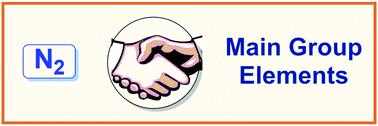当前位置:
X-MOL 学术
›
Chem. Soc. Rev.
›
论文详情
Our official English website, www.x-mol.net, welcomes your
feedback! (Note: you will need to create a separate account there.)
Nitrogen fixation and transformation with main group elements
Chemical Society Reviews ( IF 40.4 ) Pub Date : 2022-04-28 , DOI: 10.1039/d2cs00041e Tong-Tong Liu 1 , Dan-Dan Zhai 1 , Bing-Tao Guan 1 , Zhang-Jie Shi 1
Chemical Society Reviews ( IF 40.4 ) Pub Date : 2022-04-28 , DOI: 10.1039/d2cs00041e Tong-Tong Liu 1 , Dan-Dan Zhai 1 , Bing-Tao Guan 1 , Zhang-Jie Shi 1
Affiliation

|
Nitrogen fixation is essential for the maintenance of life and development of society, however, the large bond dissociation energy and nonpolarity of the triple bond constitute a considerable challenge. The transition metals, by virtue of their combination of empty and occupied d orbitals, are prevalent in the nitrogen fixation studies and are continuing to receive a significant focus. The main group metals have always been considered incapable in dinitrogen activation owing to the absence of energetically and symmetrically accessible orbitals. The past decades have witnessed significant breakthroughs in the dinitrogen activation with the main group elements and compounds via either matrix isolation, theoretical calculations or synthetic chemistry. The successful reactions of the low-valent species of the main group elements with inert dinitrogen have been reported via the π back-donation from either the d orbitals (Ca, Sr, Ba) or p orbitals (Be, B, C…). Herein, the significant achievements have been briefly summarized, along with predicting the future developments.
中文翻译:

主族元素固氮转化
固氮对于维持生命和社会发展至关重要,但三键的键离解能大和非极性构成了相当大的挑战。过渡金属凭借其空轨道和占据 d 轨道的组合,在固氮研究中很普遍,并且继续受到关注。由于缺乏能量和对称可接近的轨道,主族金属一直被认为不能进行二氮活化。在过去的几十年中,主族元素和化合物的二氮活化取得了重大突破。无论是基质分离、理论计算还是合成化学。已经报道了主族元素的低价物种与惰性二氮的成功反应,通过来自 d 轨道(Ca、Sr、Ba)或 p 轨道(Be、B、C…)的 π 回馈。在此,简要总结了重大成就,并预测了未来的发展。
更新日期:2022-04-28
中文翻译:

主族元素固氮转化
固氮对于维持生命和社会发展至关重要,但三键的键离解能大和非极性构成了相当大的挑战。过渡金属凭借其空轨道和占据 d 轨道的组合,在固氮研究中很普遍,并且继续受到关注。由于缺乏能量和对称可接近的轨道,主族金属一直被认为不能进行二氮活化。在过去的几十年中,主族元素和化合物的二氮活化取得了重大突破。无论是基质分离、理论计算还是合成化学。已经报道了主族元素的低价物种与惰性二氮的成功反应,通过来自 d 轨道(Ca、Sr、Ba)或 p 轨道(Be、B、C…)的 π 回馈。在此,简要总结了重大成就,并预测了未来的发展。











































 京公网安备 11010802027423号
京公网安备 11010802027423号